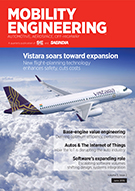Journal Article
Using Delphi and System Dynamics for IoT Cybersecurity: Preliminary Airport Implications
2021-03-02
2021-01-0019
Day by day, airports adopt more IoT devices. However, airports are not exempt from possible failures due to malware’s proliferation that can abuse vulnerabilities. Computer criminals can access, corrupt, and extract information from individuals or companies. This paper explains the development of a propagation model, which started with a Delphi process. We discuss the preliminary implications for airports of the simulation model built from the Delphi recommendations.







